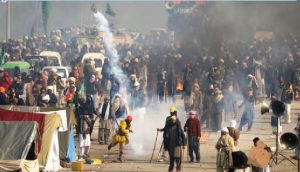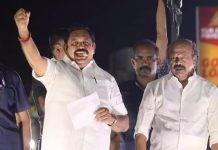 With the deepening of the ongoing political-administrative crisis aggravated by the near economic collapse in the neighbouring Pakistan, a human crisis may explode any moment. The sky-rocketing price-rise accompanied by rampant joblessness in Pakistan has alarmed not only Indian leadership, but it has caused worldwide concerns. The apprehension is that the Indian sub-continent too may face a Turkey-Syria like conflict. The eruption of large scale violence may lead massive flow of refugees towards India, which has more than 3000 kilometers of border with the strife-torn neighbor covering her four states, Gujarat, Rajasthan, Punjab and Jammu-Kashmir.
With the deepening of the ongoing political-administrative crisis aggravated by the near economic collapse in the neighbouring Pakistan, a human crisis may explode any moment. The sky-rocketing price-rise accompanied by rampant joblessness in Pakistan has alarmed not only Indian leadership, but it has caused worldwide concerns. The apprehension is that the Indian sub-continent too may face a Turkey-Syria like conflict. The eruption of large scale violence may lead massive flow of refugees towards India, which has more than 3000 kilometers of border with the strife-torn neighbor covering her four states, Gujarat, Rajasthan, Punjab and Jammu-Kashmir.
The proposed Azadi March on October 27 of the Jamait Ulema-i-Islam (JUI) leader, Maulana Fazlur Rehman demanding the resignation of the Imran Khan government has made the political situation in Pakistan quite explosive. He is being supported by the two main opposition parties, People’s Party and Pakistan Muslim League (PML)-Noon.
In each sector of the Pakistani economy, whether it is textile, food, pharmaceuticals, the growth is negative. It has already led to vast unemployment. The statistics of the Pakistani government has accepted that during the financial year 2018-19, five lakh graduates were unemployed, 2.60 lakh engineering graduates are seeking jobs. The journalists working in prominent dailies are being sacked or their salaries have been reduced. The Express Tribune has already dismissed its 12 reporters, and the Dawn has reduced its pages. The advertisements from corporate have almost disappeared. In spite of the claim of Dr. Abdul Hafeez Shaikh, Financial Advisor to the Prime Minister Imran Khan, that the growth of the industrial sector has increased by 1.40 per cent, the current economic scenario is dismal. Shaikh’s economic survey has blamed reduction in the production of the natural gas is responsible for the decline, but the truth is that the political and economic situation in the country is heading towards an indefinite future.
Indian apprehensions
India may face a repeat of the 1970-71 political conflict, when Pakistan’s eastern wing with its majority population had seceded. It had led to the formation of Bangladesh. India had faced more than 10 million refugees from the East Pakistan. The situation had worsened following the large scale massacre of its citizens by Pakistani army. In spite of the U.S. support, Pakistani forces had to surrender before the Indian forces. In the contemporary Pakistan, the army is ruling the country under a façade of democracy.
The face of the so-called democratically elected government is Imran Khan, a world-class cricketer-turned political leader. Khan, a favourite of the army generals was first offered a political role during the regime of General Zia-ul-Haq. In later years, he was invited to join the PML(Noon) led by the former prime minister Nawaz Sharif. Imran Khan had declined these political offers, but he launched his own party, Pakistan Tehreek-in-Insaf (PTI).
The much-pronounced mission of PTI has been to cleanse the corruption-infested Pakistan. He initiated countrywide campaigns against the Sharif government, who did not have support of the generals. In 2018, Imran Khan was imposed upon the country amidst the complaints of large scale bungling and manipulations in the polls. He is known as an army-favourite leader. In spite of much-rhetroic and bold statements, the Imran Khan’s government could not tackle the mounting economic challenges being faced by the country; and his government could not dismantle the terrorists training camps functioning under the direct supervision of the Pakistani armed forces.
Amidst these challenges, it is yet to be ascertained whether Imran Khan’s decision to give three-year extension to the present army chief, Qamar Javed Bajwa, would help him in retaining office. It is quite known in the knowledgeable sections that Bajwa had helped Imran’s march to power in 2018, and thus giving him an extension, he has reciprocated the favour he had received from the general.
Maulana Fazlur Rehman’s proposed march scheduled on October 31 reveals that a section of the Pakistani establishment, a word coined by the Pakistani journalists and leaders for the armed forces, has become disillusioned with Imran Khan. It is quite known in Pakistan that no big movement can be launched in Pakistan without tacit support of the establishment. During the 2018 elections, with the connivance of the Pakistani establishment, its so-called non-state players, the terrorists, and the Inter-Service Intelligence (ISI) agents have succeeded in inducting a large number of provincial leaders of Bhutto’s People’s Party and Sharif’s Pakistan Muslim League (N) in the PTI.
The political developments indicate that it will be difficult to retain Khann in this volatile political situation either Bajwa will directly assume power replacing his nominee Imran Khan till a new face could be identified. There are reports of growing differences within the establishment regarding Bajwa’s extension for another three years. If the rivalry for supremacy for power within the establishment contnues, it may lead to an unprecedented violence.
The present Pakistani government may survive till February 2020, but its future is uncertain. Few may trust Khan’s capacity to tame non-state players or the terrorists to save Pakistan being sent to the black list. Within the establishment, the non-state players have patrons. The army and its intelligence wing, Inter Services Intelligence (ISI) too the international pressure to dismantle the terror camps and their funding.
The blame game
The Pakistani establishment has repeatedly accused India of fragmenting Pakistan. A number of senior Pakistani scholars, however, have repeatedly blamed myopic leaders of the western wing Pakistan and the army dictators for the uprising of its eastern wing. The situation in the contemporary Pakistan is equally bad, if not worse, what the country faced during the period 1970-71.
About half-a-century ago, it was tall handsome Punjabis versus dark-complexioned short-heighted Bengalis. The common faith, Islam, could not bind them together. The Bengali Muslims had refused to dump their language and culture, though during the British regime they had supported a separate homeland for Muslims under the leadership of S.H. Surahwardi, a Muslim League leader.
Apart from the issue of imposing Urdu on Bengalis, the alienation with the rulers was further aggravated amidst the reports that the most of earnings from exports was spent on the development of the country’s western wing. The refusal of the army dictator, General Agha
Muhammed Yahya Khan (third president of the united Pakistan, who served the post from March 25, 1969 till December 1971), to sworn in the majority party, Awami League, leader, Sheikh Mujibur Rahaman, as the elected prime minister.
The history appears to be repeating itself. During the 1970-71, the conflict was between the Punjabi and Bengali Muslims. In the contemporary Pakistan, the ethnic divide has increased among the people of the provinces, whether they are Baloch, Sindhi, Pakhtoon or Punjabi. The people of Baluchistan are angry that their lands have been sold off to the Chinese in the name of development of roads and infrastructure. The billions of dollars obtained from the foreign sources have been siphoned off to meet the luxurious life of the Pakistani generals and their fellow travelers in politics. The ethnic division has further sharpened with the near-collapse of the country’s economy.
Lessons in past experience:
If the army rulers and the People’s Party leader, Z.A.Bhutto, had honored the verdict of the elections, and had allowed the winning Awami League’s leader, Sheikh Mujibur Rahman to form government at Islamabad, Pakistan’s unity could have been retained. During the post-partition years, Pakistan was mostly ruled by the army junta. Bhutto was a bright young man, who was being groomed by the Pakistani army during the Ayub years. Mujibur Rahman was not acceptable to the army, which used Bhutto to prevent the democratically elected leader, Mujibur Rahman, to occupy the seat of power in the country.
The army’s control in the West
Pakistan was always dominant. It did not allow anyone to weaken directly or indirectly the controls of army. Bhutto was hanged, his daughter, Benazir, was assassinated by some unknown assassins and the former prime minister, Mia Muhammed Nawaz Sharif, and his daughter Marian are in jail under one or the other pretext. In its bid to further stifle political
opposition, the National Accountability Bureau (ABC) has not only arrested Sharif, but got him convicted through a sham judicial process. The ABC has so far not nabbed any general, though most of them enjoy lavish retirement life in London or Dubai.
In spite of all these repressive measures, Pakistani journalists, continue to reveal the political decline of the Khan’s government and the growing differences among the members of the establishment comprising serving generals. The establishment got also arrested Mariam, Sharif’s daughter, who is now a political challenge to the power-centre, the General Headquarters (GHQ).
Disillusioned with Imran
Imran Khan, a darling of Pakistani dictators, became the choice of the establishment, and succeeded in becoming prime minister through intensive political campaigning in 2018. However, due to his inability to release Pakistan from the stranglehold of army which supports terrorists, Khan could not attract investments from abroad. His frequent visits to China, Saudi Arabia, Washington cold not attract any economic-relief to the resource-starved Pakistani economy.
There are few takers to his slogan to convert Pakistan into a welfare state on the pattern of the legendary state of Madina. According to a quote circulated by an international news agency, a taxi driver told journalists that “I would like to set my car on fire. The fuel prices are up by 50 per cent and few want to hire a taxi.”
The food grains and essentials are getting costlier with each passing day. Imran Khan cannot blame others for his political opportunism. In his bid to get power, he had allowed himself to be used against Sharif, who had lost the favour of the establishment. His party, PTI, had received full support of the GHQ as well as ISI during the 2018 polls.
His inability to win any friend among the prominent world leaders against India has further reduced his support base in the establishment. The JUI’s ongoing movement against Imran Khan is believed to have support of the GHQ. It has surprised a number of journalists, including Najam Sethi, and Hasan NIssar, who are unable to explain that how this march could be possible without the consent of the high and mighty in the establishment.
In spite of his efforts, Imran Khan, could not make inroads in the international politics to win support for Pakistani establishment, which continues to violate the international directives for winding up its terror structure. Meanwhile, Bajwa has started talking to businessmen and industrialists for saving the country’s economy, a job expected to be done by politicians. It is yet to be ascertained that what would be the implications for the army officers’ promotion, The extension to Bajwaa has definitely disturbed the other senior army officers seeking promotion to the post of army chief. One of them is Lt-General Sarfarz Sattar, who could have been the army chief, if Bajwa were not given extension.
The flow of the capital to save Pakistan’s fragile economy is dwindling. The situation could have improved if USA, Western Europe and India had not refused to accept Imran’s outbursts against the past Pakistani regimes supporting terrorism seriously. Even the non-resident Pakistani too are not able to send much funds to Pakistan in spite of Imran’s repeated appeals.
Meanwhile, India has successfully checkmated Pakistani-sponsored terror activities in the Kashmir valley, and except a few outbursts from Malaysia and Turkey, no Muslim country has seriously criticized India on the removal the special constitutional status to Jammu and Kashmir. The Indian concern is the worsening political and economic situation in Pakistan. It may have grave implications for the country too.
letters@tehelka.com













